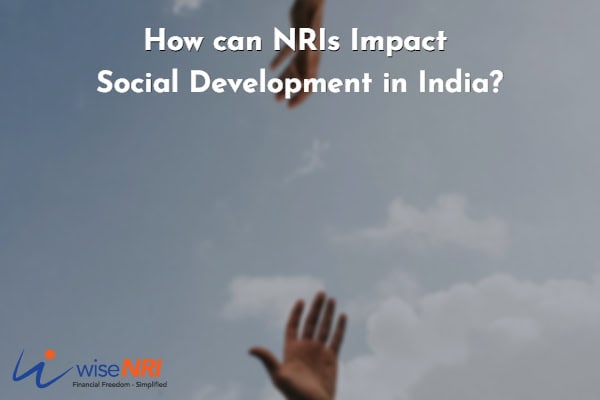From distant shores to the heart of India’s social landscape, Non-Resident Indians (NRIs) wield a profound influence, shaping the nation’s trajectory towards progress and development.
As per a 2023 Bain & Co. report, family philanthropy in India has grown by 12% over the last five years. With an expanding middle class and the growth in the number of donors, retail giving is expected to grow at 9% annually. The concept of ‘giving back’ to one’s homeland is close to heart for most Non-Resident Indians (NRIs). They look for opportunities to contribute to the socio-economic development of India.

Sometime back I did a mall survey and got these answers. There are different avenues through which NRIs can engage in philanthropy:
- They can establish or contribute to funds to help underprivileged students in India afford quality education and improve school facilities.
- They can participate in funding campaigns focused on health matters such as vaccination, maternal health, and disease prevention.
- Environmental conservation is a critical issue that requires funds. NRIs can support initiatives related to river cleaning, reforestation, wildlife protection, etc.
- Natural calamities such as floods, landslides, and earthquakes cause massive losses of life and property. NRIs can contribute to relief efforts related to natural disasters or crises.
- NRIs can take part in art and heritage Conservation by supporting projects that promote Indian art, culture, and heritage and help artisans and craftsmen find markets for their products.
NRIs can contribute in different ways, such as making direct donations, volunteering their time and skills, and supporting social enterprises. For instance, you can donate to initiatives such as Akshaya Patra Foundation, a non-profit organization that implements the Mid-Day Meal Program in schools, or WaterAid India, which is committed to making clean water, decent toilets, and good hygiene accessible for everyone, everywhere.
NRIs can assist NGOs by utilizing their professional skills in fundraising, marketing, communication, etc., thereby making a positive impact on society. They can also volunteer their time and efforts with NGOs and not-for-profit organizations that are involved in teaching less privileged children, conducting medical camps, or working towards the empowerment of women, etc.
One of my favorite sites for contribution is Bharat Ke Veer, dedicated to supporting the families of soldiers who made the ultimate sacrifice for our nation. What could be more meaningful than aiding those who have given everything for us?
What else NRIs can do?
Investment and Entrepreneurship:
NRIs should consider leveraging their financial resources and expertise to drive economic growth in India through strategic investments and entrepreneurial ventures. By directing their investments towards infrastructure projects, technology startups, and innovative ventures, NRIs can contribute to social progress and job creation.
These investments have the potential to modernize infrastructure, stimulate innovation, and create employment opportunities, ultimately improving the quality of life for millions of Indians.
Tips – NRI Small Business Owner
Knowledge and Skills Transfer:
NRIs should actively participate in knowledge exchange programs, mentorship initiatives, and skill development workshops to share their expertise and experiences with local communities and professionals in India. By providing mentorship and guidance to aspiring entrepreneurs, students, and professionals, NRIs can inspire and empower the next generation of leaders.
Additionally, collaborating with educational institutions and non-profit organizations to organize skill development programs can help bridge the skills gap and enhance the employability of the local workforce, contributing to India’s socio-economic development.
Check – NRI’s contribution to the Indian Economy
Tax implications
An NRI is eligible for deduction on donations if the NGO has received approval from the government to receive foreign donations, it is registered under Section 80G of the Income Tax Act, and the donation is made via electronic means.
The involvement of NRIs in philanthropic activities can play a pivotal role in addressing India’s social challenges. Engaging in philanthropy not only benefits the recipients but can also provide satisfaction and a sense of purpose to the donor.
As NRIs contribute their bit, their efforts echo the sentiment of ‘Home is where the heart is,’ illuminating a hopeful path towards a better India for all. Please share how you are contributing to your mother land.
